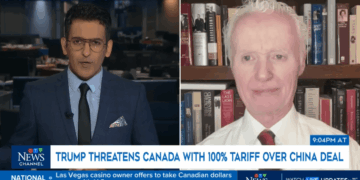This article originally appeared in The Hill.
By Balkan Devlen, February 12, 2025
It was a whirlwind three days for American-Canadian relations. On Feb. 1, the Trump administration slapped a 25 percent tariff on Canadian exports, and a 10 percent tariff on its energy products. At the eleventh hour, after two conversations with Canadian Prime Minister Justin Trudeau, President Trump agreed to pause the implementation of tariffs for 30 days.
His apparent justification for this unprecedented breaking of the Canada-U.S. relationship is Canada’s weak border security and illicit flows of migrants and fentanyl coming into the U.S. The 30-day reprieve came after Trudeau gave assurances about redoubling efforts to address Trump’s concerns. Most of those policies had already been announced by the Canadian government weeks ago.
This temporary sigh of relief, however, does not resolve the fundamental issue.
The problem is that Trump’s tariffs will be counterproductive and damage Canada’s capacity to invest in national security and defense. If Trump really wants a more secure border and for Canada to get its national security in order, he is going about it the wrong way.
For more than a century, Canada and the U.S. have stood shoulder-to-shoulder in defense and prosperity, sharing the longest undefended border in the world and a robust security partnership exemplified by institutions like NORAD. This alliance has been built on a mutual trust that faces a direct assault when economic policy becomes a tool of coercion. The consequences of this coercion are not confined to balance sheets; they ripple into the realm of national security and national defense.
In short, this turn by Trump against America’s closest ally jeopardizes not just Canadian interests but American safety as well.
First, trust is the bedrock of our shared security. When the U.S. resorts to punitive tariffs against Canada, it sends a perilous message: Even allies with decades of dependable partnership are fair game for economic retribution. The deep trust that underpins our joint defense strategies is not an expendable commodity. A betrayal of this trust risks eroding the solidarity that has kept North America secure. If America can weaponize trade against Canada, what does that portend for other long-standing allies who depend on U.S. support?
Second, these tariffs will directly restrict Canada’s ability to invest in defense — investments that are critical to protecting America’s northern flank.
It is true that Canada has been lagging in bolstering its defense capabilities, with only vague plans announced at the last NATO Summit to meet NATO’s target of spending 2 percent of GDP on defense. Americans have rightfully highlighted the need for Canada to take ownership of securing the Arctic and NATO’s Northwestern flank. However, the economic blow delivered by these tariffs will force the Canadian governments of today and tomorrow to divert funds toward cushioning the impact on affected businesses and workers.
Reduced fiscal capacity means fewer resources available to upgrade defense spending in key areas such as Arctic security and our contributions to NORAD. A financially hamstrung Canada is less able to shoulder its share of the continental defense burden.
Third, an economic showdown with Canada sets a dangerous precedent for American alliances worldwide. America’s partners in Europe, Asia and beyond are watching closely. When the U.S. employs economic coercion against its closest ally and neighbor, it risks alienating allies who might otherwise look to Washington for security guarantees.
This message — that economic dependence on the U.S. is a liability — will spur other nations to hedge their bets. The ensuing realignment could fracture the network of alliances that has long amplified American power on the global stage. In an era when strategic partnerships are more crucial than ever, isolating reliable friends is a recipe for long-term instability.
Fourth, as America turns inward with aggressive tariff policies, adversaries like China are ready to exploit every rift. Beijing has long sought to deepen its ties with Canada and other nations. With the U.S. preoccupied by trade wars with allies, China finds an opening to further erode the solidarity of the Western alliance.
This is not a mere theoretical risk; history shows that opportunistic powers readily step into any vacuum left by discord among allies. If Washington continues to treat trade as a weapon against its nearest neighbor, it inadvertently hands China a strategic foothold in regions where American influence has traditionally prevailed. In effect, what might be intended as a short-term economic maneuver could yield long-term strategic gains for a rival determined to weaken the very alliances that have long protected American interests.
American strength has never rested solely on its vast economic and military might — it has also depended on the unbreakable bonds of trust and cooperation with its allies. The decision to wage a tariff war against Canada is a strategic miscalculation that ultimately undermines the foundation of North American security.
When America turns on Canada it harms itself. A trade war with Canada is not a victory for American workers; it is a victory for instability and our adversaries. Now is the time for American policymakers to recognize that true strength lies in the unity of trusted partners, not in the short-sighted pursuit of protectionist gains.
Instead of turning economic policy into a battleground, let us work together to fortify the alliances that have kept North America secure for generations.
Balkan Devlen is director of the Transatlantic Program at the Macdonald Laurier Institute and a senior fellow at the Center for North American Prosperity and Security.








